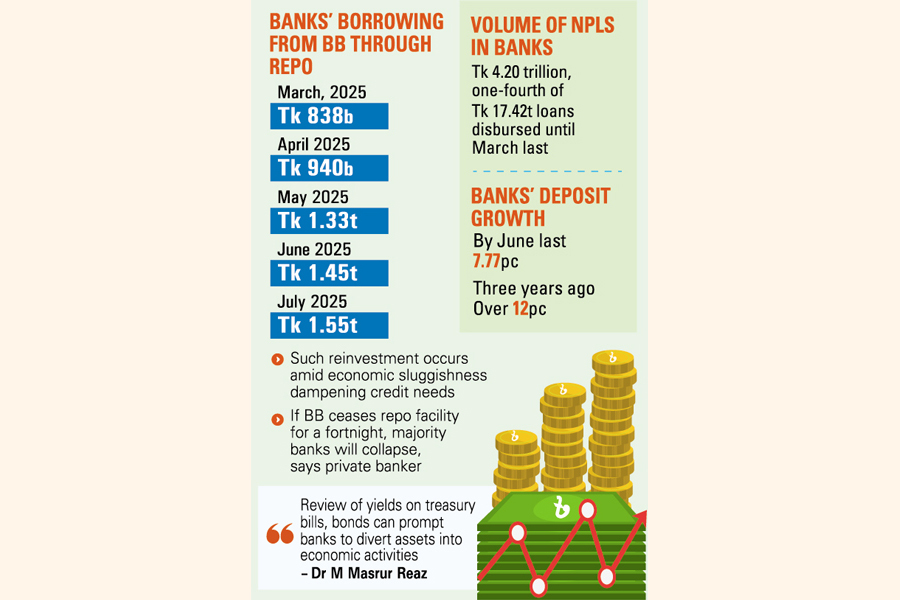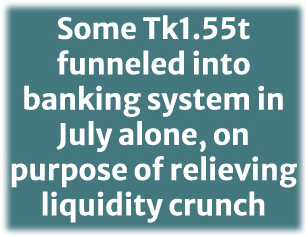Borrow through repo, invest in plum treasuries
Banks’ borrowings from BB window hit record high

Published :
Updated :

 Commercial banks' hefty borrowings from the central bank betray perceived double dealings-healing liquidity crunch in the banking system and investing the funds in plum state treasuries.
Commercial banks' hefty borrowings from the central bank betray perceived double dealings-healing liquidity crunch in the banking system and investing the funds in plum state treasuries.
According to bankers and money-market analysts, the banks need fund feeding principally as the deposit growth remains stymied amid higher non-performing loans (NPLs) regime in the banking sector. As such, the volume of commercial lenders' borrowings by using repo instrument of the Bangladesh Bank (BB) continues ballooning to meet their local-currency obligations.
According to the latest data available with the BB, the country's scheduled banks altogether borrowed Tk 1.55 trillion from the banking regulator under the repo facility in July 2025-at the very outset of the financial year.
Off the amount, over 72 per cent or Tk 1.11 trillion was taken on 14- day maturity while the remaining Tk 360 billion and Tk 74.37 billion came from 7-day maturity and overnight facility respectively.
Under the repo-backed liquidity feeding by the central bank, the figures of borrowed funds were Tk 1.45 trillion, Tk 1.33 trillion, 940 billion and Tk 838 billion in June, May, April, and March last, the data show.
The commercial lenders needing short-term liquidity are largely bent on 14-day-tenure repurchase instrument of the BB and keep banking on it as much as possible. As a matter of fact, the volume of credits handed out through the liquidity-availing window continues surging.
A different dimension to the hefty borrowings, however, came into light in a close scrutiny. Allegations from a number of bankers and BB officials are rife that some of the commercial banks frequently use such instruments to avail short-term funds and invest in long-term government securities to gain more under the persisting economic sluggishness.
This trick of the trade, however, leads to the squeezing of yields on treasury bills and bonds.
Seeking anonymity, a BB official has said the rising use of the repo-backed funds indicates that majority of the commercial banks have been facing serious liquidity crunch in recent times.
The central banker says the deposit growth remains low of late because of trust deficit in the banking system after massive-scale loan-related irregularities got exposed following the July-August mass uprising that toppled the Sheikh Hasina government.
On the other hand, the BB official adds, the volume of NPL in banks keeps mounting, reaching Tk 4.20 trillion that is almost one-fourth of the entire loans worth Tk 17.42 trillion disbursed by the banks until March last.
"So, the banks have no other option but to rely heavily on central bank repo instrument to overcome the formal-credit mismatch," the central banker told the FE writer.
According to the BB data, the deposit growth stood at 7.77 per cent by June last. It was more than 12 per cent even three years ago.
On condition of not being quoted by name, the treasury head of a commercial bank has said commercial banks normally use the short-term liquidity instrument of the BB to meet CRR (cash reserve ratio) requirement. But the reality is different.
The commercial lenders frequently use such instruments to avail short-term funds and invest the money in long-term government securities to gain more under the persisting economic sluggishness, he adds.
Sharing statistics, the seasoned banker says the banks need to keep 4.0 per cent as CRR with the central bank, which amounts to around Tk 800 billion.
"But the commercial banks borrowed Tk 1.55 trillion in July last. It indicates how serious the liquidity crunch in banks is. If the BB stops giving repo facility for a couple of weeks, majority of the banks will collapse," he said.
Under such circumstances, the treasury head said, the banking regulator keeps squeezing repo facility following lending condition set by the IMF (International Monetary Fund), which is "unfortunate".
The regulator has already curtailed repo facility to once a week from daily dealings. It also discarded 28-day repo facility and is about to scrap 14-day facility within next few months.
Dr M Masrur Reaz, an economist and chairman of the Policy Exchange of Bangladesh, says commercial banks seem to cash in on prevailing arbitrage opportunity by availing the credit at repo rate of 10 per cent and invest in government securities bearing a rate above 10 per cent.
"By doing so, the banks keep making profit in the risk-free investment instruments amid prevailing economic sluggishness," he told The Financial Express.
Apart from confidence-boosting drives to bolster deposit portfolios, the economist suggests, the central bank can now look into review of yield in treasury bills and bonds so that banks are encouraged to divert their assets into productive economic activities.
jubairfe1980@gmail.com


 For all latest news, follow The Financial Express Google News channel.
For all latest news, follow The Financial Express Google News channel.